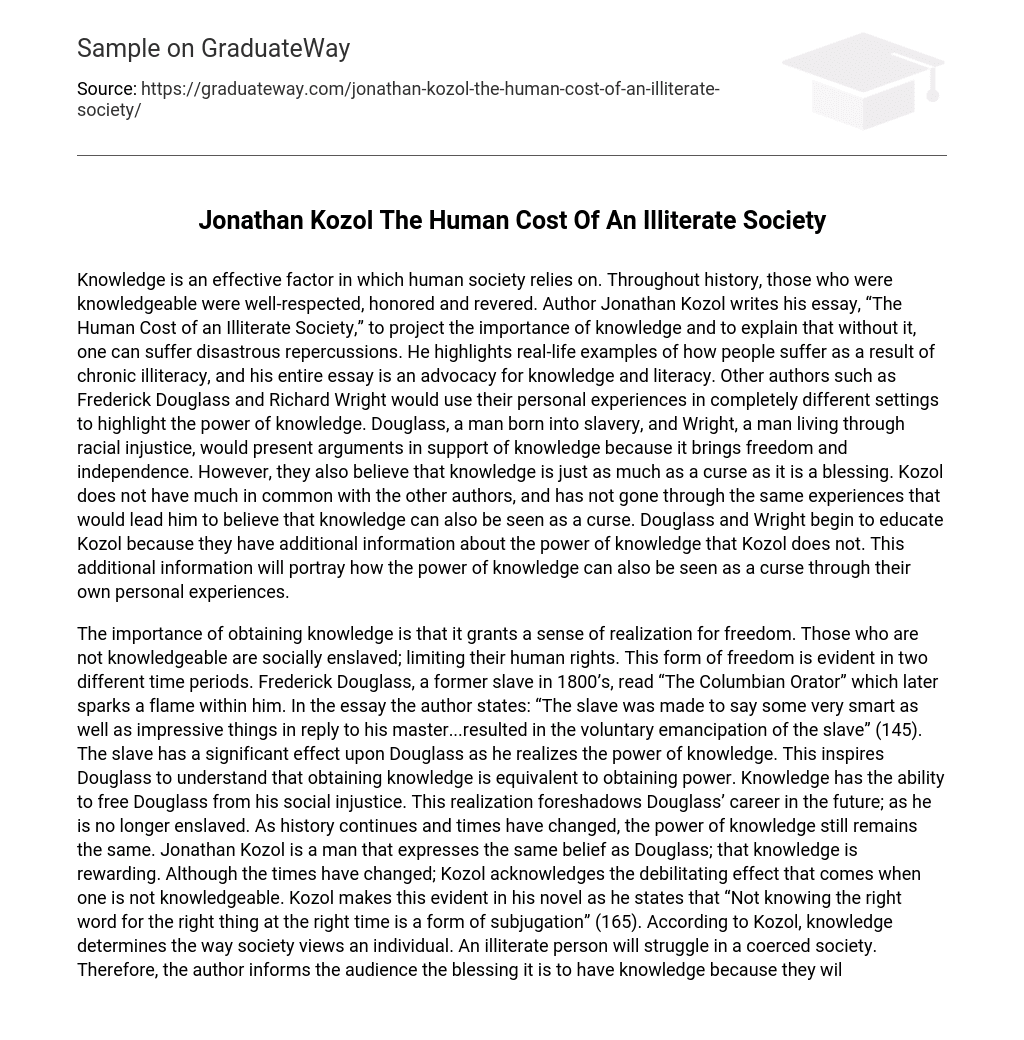Knowledge is crucial in society, and throughout history, knowledgeable individuals have been respected and honored. Jonathan Kozol’s essay, “The Human Cost of an Illiterate Society,” emphasizes the significance of knowledge and warns of the dire consequences of its absence. He provides real-life examples of the suffering caused by chronic illiteracy, advocating for knowledge and literacy. Similarly, Frederick Douglass and Richard Wright draw on their personal experiences of slavery and racial injustice to underscore the transformative power of knowledge. They argue that knowledge brings freedom and independence but also acknowledge its potential drawbacks. In contrast, Kozol lacks the same experiences that would lead him to view knowledge as both a blessing and a curse. Therefore, Douglass and Wright educate Kozol by sharing their additional insights into the dual nature of knowledge, based on their own life stories.
The significance of acquiring knowledge lies in its ability to provide a profound understanding of freedom. Individuals lacking knowledge find themselves socially imprisoned, restricting their human rights. This concept of freedom is observed in two distinct historical eras. In the 1800s, Frederick Douglass, a former slave, discovers enlightenment through reading “The Columbian Orator.” This enlightening experience leads him to realize the influence knowledge possesses. Douglass comprehends that obtaining knowledge is equivalent to obtaining power. Knowledge has the potential to liberate Douglass from his unjust societal circumstances. This realization serves as a foreshadowing of Douglass’ future achievements, as he triumphs over his enslavement. As time progresses and society evolves, the power of knowledge continues to hold true. Jonathan Kozol shares the same belief as Douglass in the rewarding nature of knowledge, despite the changing times. However, Kozol acknowledges the crippling consequences when one lacks knowledge. In his novel, he argues that being unable to express oneself appropriately limits personal freedom, leading to subjugation. According to Kozol, society’s perception of an individual is heavily influenced by their level of knowledge. In a society that pressures conformity, an illiterate person will encounter immense difficulties.The author emphasizes the importance and benefits of knowledge by stating that it liberates individuals from social enslavement. In this way, possessing knowledge is seen as a powerful tool in combatting social injustice.
Both Douglass and Wright have similar reactions to the knowledge they acquire. When Wright gains access to a library, he starts reading and learning about different perspectives and how others think. As he reads, he becomes aware of the pain caused by what he has learned, as evident in the quote “But to feel that there were feelings denied me, that the very breath of life itself was beyond my reach, that more than anything hurt, wounded me,” (351). Reading raises his hopes and spirits but also brings him down to a new low, as he discovers all the missed opportunities that were intentionally kept away from him due to his position. Wright had hoped to find answers about why he was treated a certain way and what it meant for his freedom, but despite having evidence of his unjust condition, he realizes there is little he can do about it. Similarly, Douglass realizes through his own learning that knowledge alone does not guarantee immediate freedom.
The text emphasizes the frustration of gaining knowledge without finding a solution or way out of a difficult situation. The quote “Knowledge had given me a view of my wretched condition, without the remedy. It opened my eyes to the horrible pit, but to no ladder upon which to get out” (146) illustrates this point. Despite acquiring knowledge about emancipation and abolition, the protagonist lacks a practical means to achieve freedom from slavery. This realization leads him to believe that “learning to read and write has been a curse rather than a blessing” (146). Wright and Douglass, who share similar experiences, agree that literacy offered hope but no guidance, while Kozol argues that illiteracy leads to an insecure existence (161). However, both Wright and Douglass argue that feelings of hopelessness and powerlessness are not limited to illiterates; individuals who possess literacy skills can also find themselves overwhelmed with knowledge that offers no solutions. Thus, the uncertainty felt by both literates and illiterates is similar in nature, resulting from a lack of practical knowledge.





